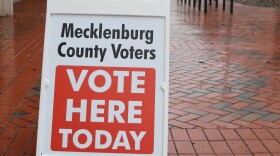Sweeping elections legislation that could substantially change the way North Carolinians vote next year advanced in the state House Tuesday.
The House Committee on Election Law and Campaign Finance Reform made key changes to an omnibus measure that passed the Senate in June. However, one thing that did not change is the legislation would eliminate a three-day grace period for receiving and counting mail-in ballots postmarked by Election Day.
The grace period has been in place since 2009 but became a target of the Right’s ire amid partisan rancor over the 2020 elections.
Republican antipathy for the grace period is rooted in their anger over a 2020 legal settlement North Carolina Democratic Attorney General Josh Stein — who's now running for governor — along with the governor-appointed state elections board entered with voting rights advocates who sued for easing ballot access amid the COVID-19 pandemic.
The settlement resulted in an extension of the grace period by an extra six days. It also attempted to allow voters whose mail-in ballots did not contain the proper witness information to correct those errors by affidavit. A federal court upheld the grace period extension but said doing away with the witness requirement was an unconstitutional circumvention of legislative authority.
But House lawmakers have proposed other significant changes to the measure. Whereas the Senate version would have required same-day registrants to cast provisional ballots, under the House substitute measure, people with the right documentation — a photo ID with a valid address, or a photo ID with an accompanying document like a utility bill or government-issued identification that contains the voter's address — could cast a regular ballot.
And the House's proposed committee substitute, or PCS, contains language that lays greater detail on what appointed partisan poll observers can and cannot do at voting sites. Republican lawmakers in the House had drafted a stand-alone bill, HB 772, that would have allowed partisan poll observers to move more "freely" around voting sites.
Observation or intimidation?
Giving freer rein to poll observers has been an issue championed by groups tied to baseless claims of widespread vote fraud, such as the North Carolina Election Integrity Teams, or NCEIT. The group drafted model legislation that served as a template for an earlier House measure that would have permitted poll observers to position themselves within five feet of registration tables, ballot tabulators, and curbside voting sites, and to overhear conversations between precinct officials and individual voters. Voting rights advocates have expressed concerns that such proximity could intimidate voters.

But Grey Mills, the House committee chairman, introduced an amendment — adopted by the committee — that removed the word "freely" from the modified bill's text. Instead, the measure would prevent precinct officials from impeding observers' movement around the voting site.
"We want a fair, we want a balanced situation there, something that's good for everyone at the polling place," Mills told WUNC after Tuesday's committee meeting.
Rep. Pricey Harrison, a Democrat from Greensboro, who opposed the legislation, did acknowledge some satisfaction with the tweaks, including the change to language governing poll observer conduct.
"I am grateful to the leadership, both in the House and the Senate, for making several of the changes that we suggested," said Harrison before the committee's vote on the substitute legislation. "But I still think that this bill, bottom line, is going to make it harder for individuals to vote."
Even Jim Womack — president of NCEIT, which is connected to the Election Integrity Network — expressed satisfaction with parts of the bill.
The Election Integrity Network was established by Cleta Mitchell, the North Carolina-based attorney who infamously participated in the post-2020 election phone call in which Donald Trump urged Georgia Secretary of State Brad Raffensperger to "find" the nearly 12,000 votes that would have reversed the legitimate outcome of the presidential race.

During the public comment segment of Tuesday's committee meeting, Womack said he and his organization were "very satisfied with parts of it."
Womack took exception, however, with what he called one of the "most egregious" parts of the bill, a provision that would allow unaffiliated voters to participate in the partisan primary of their choice.
Many critics of the bill noted that the state legislature has not yet passed a budget, and yet the legislation contains no funding for educating voters about the sweeping changes that could come.
Committee Chairman Mills acknowledged the funding needs and said that would be taken up with appropriations chairs.
The modified legislation now must go through the House Rules Committee before going to the full House for votes.







